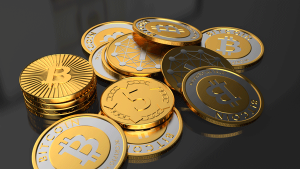 Bitcoin has been in the news a lot lately thanks to some wild value fluctuations and now the shutdown of one of the first exchanges where people could trade and store the virtual currency. Sadly, the shutdown of Mt. Gox and now the shows just how fragile this new type of currency can be. There is going to be a lot of talk about regulations and more countries that could ban the currency in the wake of what is in essence a bank failure.
Bitcoin has been in the news a lot lately thanks to some wild value fluctuations and now the shutdown of one of the first exchanges where people could trade and store the virtual currency. Sadly, the shutdown of Mt. Gox and now the shows just how fragile this new type of currency can be. There is going to be a lot of talk about regulations and more countries that could ban the currency in the wake of what is in essence a bank failure.
Virtual Currency
What makes Bitcoin so different from traditional currency is that it is not backed by any bank or government. Traditional currency is issued by the central bank that then backs up the value of that currency to ensure that it has some value. This used to be done with gold in the gold standard era but now it is called the greenback standard and is instead a promise of backing by the government.
One of the tools that the central bank has in controlling the value of the money is limiting the supply of the currency. This is done by the central bank essentially printing or minting the money and then destroying old notes/coins to limit the supply. They could conceivable print more money but this just causes the value of the existing money to drop which leads to inflation and hyper-inflation. With Bitcoin, they also control how many Bitcoins there in the market by a process called mining. It is a complicated subject that I won’t go into heavily but it does cost people money (electricity and computing time) to produce or mine these coins.
For more basic information, you can check out FAQ from Bitcoin.org.
Regulation
Now world currencies are regulated by their central banks and agreements between the various countries regarding the currencies and transactions help to stabilize the values of the various currencies. Since the Bitcoin system works outside of these traditional currency markets, regulation is much more complicated. Instead of general regulation most countries either allow its use or ban it. This is why some parts of the world have companies and individuals that will accept it as payment and others do not. This is also why Bitcoin got an attribution as used for illegal purposes such as with the Silk Road.
The bigger problem is what happens when an exchange or bank that deals with a virtual currency goes under. In the US, all regulated banks are required to have FDIC insurance. This means that if the bank is to completely fail, an individuals deposit in that bank will be honored by the government (FDIC) to pay up to that $250,000. Since there is no regulation of an exchange like Mt. Gox, any losses are not backed and all that money is gone just like what the company recently announced.
Value is Based on Supply and Demand
Now the value of a Bitcoin is based solely upon how valuable the currency is perceived to be. It might be viewed similar to what the price of gold is but that still has a physical item backing it. With Bitcoins, it is completely based upon the virtual supply of them and their perceived value. As a result, the currency has a much greater level of fluctuation than most normal currencies. This has triggered a large number of people to do speculative trading in the currency. This used to be done with the normal currency markets until government regulations stepped in.
The problem is that instances such as Mt. Gox closure or even a major country such as China announcing that they will not allow the use of the virtual currency can have a significant impact. After all, this causes the perception of the holders and investors to be less willing to hold them. This negative impact reduces demand and thus results in some of the large drops in value.
So Why is Bitcoin in Trouble?
I suspect that the news of one of the exchanges effectively closing and wiping out the value of the money people have stored in it will cause a drop in the value. This has likely already hit the market when the Mt. Gox exchange first stopped transactions. Since then, the value has bounced back some. I think the bigger problem is going to be potential regulations by governments or the outright ban of the currency. When China stepped in, the . This could be the case in the coming months as the various governments begin their discussions on what to do.
So, if you don’t use Bitcoins at all, you don’t have much to worry about. If you have a Bitcoin wallet, you might want to take a closer look at what services you use to try and determine how safe your wallet is.
